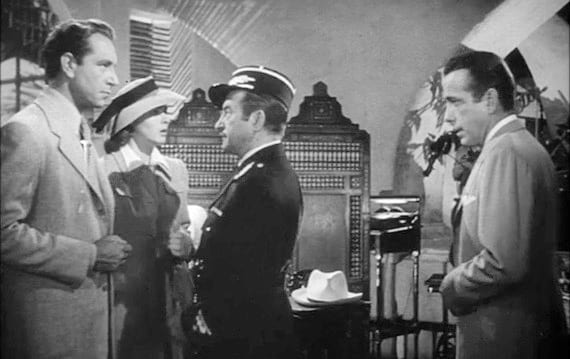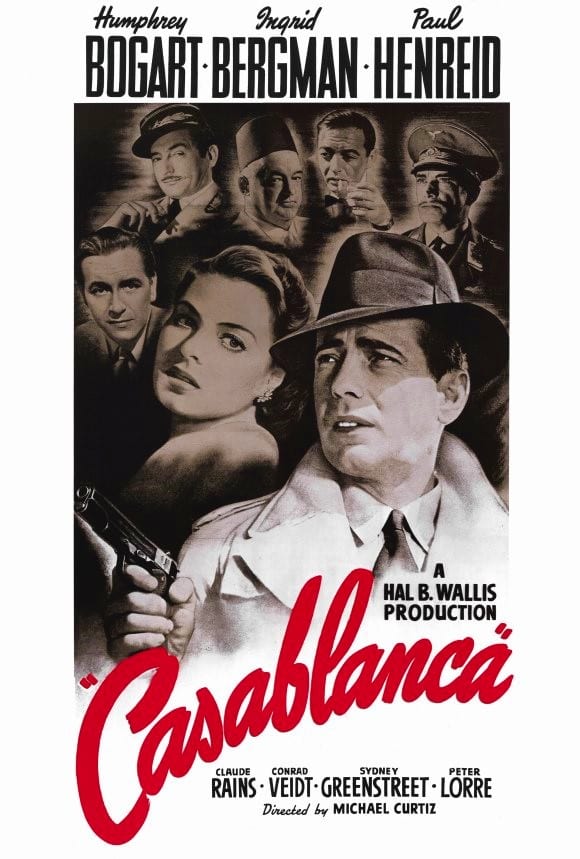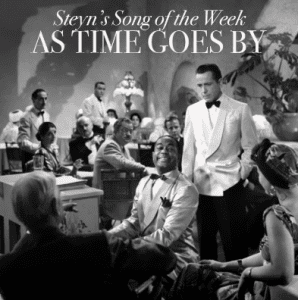
“Casablanca,” Admiral Darlan, and Rick’s Letters of Transit
Darlan, Vichy, the French Fleet, and a Question
A PBS documentary on Churchill’s destruction of the French Fleet at Oran aired a decade ago.**See Mr. Overmeyer’s note below. But I still get the same question about one of its more infamous characters, Admiral François Darlan, Prime Minister of Vichy France during the Oran attack. He was also PM in early December 1941: the time frame for Casablanca, one of the great movies of all time.
Darlan was by reputation wily, untrustworthy and scurrilous. Eisenhower made him High Commissioner in exchange for Vichy forces standing down during the November 1942 invasion of North Africa. He fell to an assassin in December 1942.
Whose signature is on the Letters of Transit?
Emily and Norman Rosenberg, professors of American and international history, first offered this sidelight on Casablanca. In the movie, the fugitive Czech, Victor Laszlo (Paul Henreid), and his wife Ilsa (Ingrid Bergman), arrive in Morocco on the run. They need to get out of Vichy territory, because Victor is a freedom-fighter and the Gestapo wants him.
Alas for Victor, his wife is the former lover of Rick Blaine (Humphrey Bogart), proprietor of Café Américain. And Rick—who proclaims himself firmly apolitical—has the only tickets out. These are a set of purloined “Letters of Transit,” granting safe passage to Lisbon, and thence to America. Rick has acquired the Letters from a shady character named Ugarte, played by Peter Lorre.
Many American viewers believe Ugarte says the Letters are signed by Charles de Gaulle. But when Norm Rosenberg wrote an analysis mentioning this, he ran into contradictions. A European professor challenged the de Gaulle theory, saying the Letters of Transit would have been signed by Darlan—not de Gaulle, who had been exiled and outlawed by Vichy. Screenwriter Howard Koch actually told Norm that de Gaulle was named (or in subtitles) in American versions of the film because he was better known.
Answer: Neither Darlan nor de Gaulle, but Weygand
Reader James Overmeyer (comments, below) solved this riddle by pointing out that the signer was neither Darlan nor de Gaulle, but General Maxime Weygand, Delegate-General in French North Africa when “Casablanca” was filmed. We confirmed this by watching the Peter Lorre episode on YouTube. Lorres’s character can clearly be heard saying “General Weygand.” Nor have we seen any evidence that a subtitle ever appeared substituting the names of Darlan or de Gaulle. (Thanks, Mr. Overmeyer.)
Sequel

As Casablanca fans all know, Rick eventually passes the Letters to Victor and Ilsa, who take off for Lisbon and freedom. Then Rick sells out and makes off with Inspector Louis Renault (Claude Rains) to join the French Resistance. Because, of course, Rick has stood for liberty all along.
Incidentally, Claude Rains loved New Hampshire’s beautiful lake district. For many years he lived in Center Harbor, five miles from me, and was a great benefactor to the community. He and his sixth wife are buried in Red Hill Cemetery. We pay an annual visit, where we recite Bogie’s final line: “Louis, I think this is the beginning of a beautiful friendship.”
As Time Goes By: the novel
Michael Walsh is a screenwriter and a friend of Hillsdale College who wrote a stunner novel for Casablanca fans. Walsh tells what happened after Ilsa and Victor left on the plane for Lisbon. He also relates Rick’s, Ilsa’s, Louis’ and Sam’s lives before they came to Casablanca. (Rick’s real name was Itzhak Baline, and Walsh explains why he had to leave New York in a hurry.) If you yearn to hear their voices again, Mr. Walsh’s book brings them to life. Not to spoil it, but Rick and Ilsa meet and love again. You won’t put this book down.

Further reading
“The Pleasures of Prague: ‘You Must Remember This‘”: The Blue Duckling restaurant in Prague. We could almost see Sam at the piano playing that song for Rick and Ilsa….
< As Time Goes By: the song
Mark Steyn’s beautiful account of “As Time Goes By,” Herman Hupfeld‘s 1931 song which hardy anybody remembered by the time of “Casablanca.” Except for one man…. Click here.
** Note: Darlan and Oran
Secrets of the Dead: Churchill’s Deadly Decision, narrated by Liev Schreiber, produced by Richard Bond, is a one-hour DVD. The conclusion (including comments by a French survivor) seems somewhat reluctantly to provide support for the Churchill Cabinet’s decision to attack the French fleet. Stills and live video support the factual story line.
Among the experts, Sir Martin Gilbert is his usual knowledgeable and articulate self. Naval historian Andrew Lambert is low-keyed and excellent; Warren Kimball is crisp and on top of the issues. The survivors of Oran are touchingly and expressively authentic. Professor Kimball said that the action “showed the British would fight…even if they fought dirty.”
Did the Marquess of Queensberry Rules apply to the Second World War? I would suggest instead Lady Soames’s conclusion: “I daresay Papa had to do some pretty rough things, but they didn’t unman him.”
Balance particularly fails over Darlan. The documentary describes him as an authoritative and trustworthy figure (lots of close-ups of the Admiral splendidly uniformed with determined expressions). But Darlan was an Anglophobe, an anti-Semite, a liar and a pompous ass, one of the most reviled Vichy leaders, and nobody mourned his assassination. A rounder view of Darlan would have better informed the account of his role in July 1940.







6 thoughts on ““Casablanca,” Admiral Darlan, and Rick’s Letters of Transit”
Just been watching Casablanca in U.K. on BBCiplayer in a superb print. To my amazement, in this version Ugarte clearly says the Letters of Transit are signed by de Gaulle! So—it must be an American version!
–
Are you sure? In Lorre’s slur, “Weygand” sound much like “de Gaulle.” I suspect we all hear what we think we hear. or want to hear! —RML
Rick’s Café Americain, which was fictional, has been created by a former American diplomat at a house in Casablanca’s old medina, with decor appropriate to the period. My wife and I had the pleasure of dining there in June and September 2019. Anyone who loves the film will enjoy visiting the cafe, whose piano player includes “As Time Goes By” in his repertoire. Our meals were tasty and the cafe has interesting souvenirs. Advance reservations are advised. The cafe’s website is http://www.rickscafe.ma/. we find other apparent replicas in Cape Town, Memphis, and Waukee, Iowa. Perhaps a reader can tell us if these approximate the recreation in Casablanca. —RML
–
Thank-you. Searching DuckDuckGo for
Actually a more prevalent theory is the letters of transit were signed by Maxime Weygand, who joined the Vichy government and in December 1940 was named delegate-general in French North Africa. As I understand it his last name is more or less pronounced “day-gan.” In the movie it is spoken by Peter Lorre who is usually identified as Hungarian although nowadays he would be classified as Slovakian. He spoke English well but with an accent. Since de Gaulle is still well-remembered while Weygand has faded from people’s memories, many assume Lorre is saying “de Gaulle.” Subtitles can vary depending on the language. I am not quite sure how well de Gaulle was known in America in 1942 when the film was made.
–
Thanks very much and I think you are right. I ran this past a French colleague and we both reviewed Peter Lorre’s appearance on YouTube. There is no doubt he says the Letters of Transit are signed by “General Weygand,” not General de Gaulle, who was then persona non-grata in French North Africa. My French friend says: “No Frenchman would pronounce Weygand (vé-gã) in any way that sounded like ‘de Gaulle’ or ‘Darlan’ (except for the final nasal ‘an’).” It’s true that de Gaulle was better known in America than Weygand or Darlan, so for Americans to think Lorre’s character said “de Gaulle” would be a natural mistake. I have amended my text accordingly. —RML
It didn’t make sense to me that a Letter of Transit signed by General de Gaulle, the leader of the Free French, would have any authority in Vichy controlled Morocco. According to the comments above from Norm Rosenberg, the writers used the name de Gaulle because he was better known by American audiences.
There are a lot of implausible scenes in Casablanca that presumably were written into the movie for cinematic reasons. However, the de Gaulle signature on a Letter of Transit, even a fictional Letter of Transit, to me was one that wasn’t necessary to make the movie work. I think that the name Darlan or any French sounding name would have worked with American audiences at that time.
–
Thank-you for your thoughtful observation, which I think is on the money. RML
I am currently reading “The Blast of War — 1939-1945” one of several volumes of memoirs by Harold Macmillan. Macmillan later was Britain’s Prime Minister; for much of his political career he was close to Churchill.
At the time of Casablanca, Macmillan was in North Africa as Britain’s civilian liaison representative at General Eisenhower’s HQ. He worked very closely there with Robert Murphy an American who held a somewhat comparable position representing Washington. A good number of chapters in the book provide a very detailed account of USA and British involvement with Darlan, Giraud and De Gaulle et al, in the long and difficult, but eventually successful, mission to achieve unity among the various French factions.
A member or the Macmillan publishing family, at one time engaged in their editing business, Macmillan’s writing style is beautifully straightforward. Although he writes from the British point of view, it is apparent that his relationships with Murphy and Eisenhower were amicable and sound, and this book will be found to be an excellent means of understanding the tortuous politics of what went on at the time.
=
Agree. I have all of his volumes inscribed. RML
Ipso facto, de Gaulle could not have signed any official document in Vichy Morocco!
Interesting Q & A on IMDb: “What exactly are “letters of transit”?
“For the plot of the movie, they’re specialized documents that allow the bearer to travel anywhere in the world, including from Nazi-occupied countries. The letters are actually a ‘MacGuffin’—a term director Alfred Hitchcock and writer Angus MacPhail coined to describe a plot point that is deliberately left vague so as not to draw too much emphasis away from the real story but still is a driving factor in propelling the story itself. The letters themselves are entirely fictional.”
=
Fun, thanks. True, but what would “Casablanca” be without them? Nor would a Vichy policeman have said, “Major Strasser has been shot. Round up the usual suspects!” RML
P.S.
Veuillez regarder la version européenne et indiquer si les lettres sont décrites comme signées par Darlan!
Comments are closed.